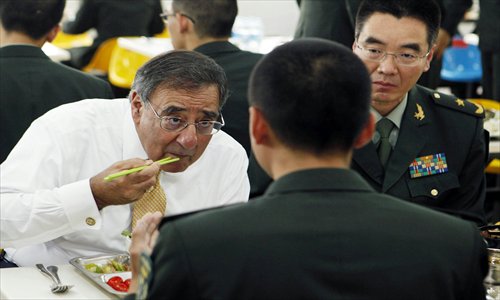Xi calls for removal of military barriers

China and the US should institutionalize their high-level military exchanges to reduce strategic miscalculation, observers have urged on the sidelines of US Secretary of Defense Leon Panetta's first visit to China since taking office in July.
Panetta on Wednesday held talks with Chinese Vice President Xi Jinping, who is also vice chairman of the Central Military Commission, following meetings with defense minister Liang Guanglie and Xu Caihou, vice chairman of the Central Military Commission on Tuesday.
During the meeting, Xi said Panetta's visit will help to further advance the relationship between both sides' militaries as well as the two countries, the Xinhua News Agency reported. Xi also voiced hope that defense authorities would remove barriers and enhance mutual trust.
Pentagon spokesman George Little described the more than one-hour discussions as "constructive and candid," covering issues ranging from North Korea to "the importance of the peaceful resolution of maritime territorial disputes," Reuters reported.
Panetta's visit comes as mutual suspicion over each other's strategic intentions runs high, with China having growing concerns over Washington's pivot shift to the Asia-Pacific region and the US skeptical about China's military buildup.
The US defense chief attempted to reassure Beijing that the rebalancing is not aimed at containing China. During a speech to the Academy of Armored Forces Engineering of the People's Liberation Army on Wednesday, Panetta said the rebalance is an attempt to engage China and expand its role in the Pacific, and create a new model in the relationship of the two Pacific powers, AFP reported.
However, Gu Guoliang, a director of the Arms Control and Non-proliferation Center under the Chinese Academy of Social Sciences' Institute of American Studies, told the Global Times that the US' strategic shift to the region is a major factor that aggravated strategic suspicion between the two militaries.
"Panetta's remarks during his visit to Japan and the deployment of another powerful US radar to Japan for its missile defense system resulted in weakening strategic trust between the two sides," said Gu.
Stressing the importance of stronger military ties, Panetta said the US and China needed to focus on building confidence and understanding between their two militaries by enhancing the quality and frequency of their dialogue and interaction.
In 2008, the two countries agreed to set up a military hotline, aiming to provide instant contact between Chinese and US defense leaders on major issues of common concern, especially in emergencies.
However, Chris Johnson, Freeman Chair in China Studies at the Washington-based Center for Strategic and International Studies, wrote in an opinion piece that appeared on the website of CNN that it has only been used a handful of times and never to test procedures in a simulated crisis.
Last year, the two sides added the Strategic Security Dialogue to the framework of the China-US Strategic and Economic Dialogue.
Sino-US military exchanges have long lagged behind political, economic and diplomatic ties, Gu said, adding that communication mechanisms have played their parts in reducing miscalculations, but the lack of institutionalized military exchanges has led to repeated freezing of ties between the two sides.
Li Jie, a researcher at the Chinese Naval Research Institute, told the Global Times that the two militaries definitely have the will and desire to keep the channels of exchanges open, given their common interests in cooperating on the issue of North Korea's nuclear program, as well as anti-terrorism and anti-piracy efforts.
However, military ties have been the most sensitive component in Sino-US relations and a main casualty of strained relations, said Li.
The Chinese mainland has always cited US arms sales to Taiwan, Washington's surveillance ships' presence off the Chinese coast as well as the National Defense Authorization Act of 2000 as the three major impediments in Sino-US military ties.
The US act prohibits the Defense Department from any military exchanges or contact with Beijing that would create a national security risk.
Johnson said in his opinion piece that such vague language effectively prohibits all but the most mundane interactions, and is one reason why consultations to date have lacked substance.
Gu said China has always expressed willingness to reinforce ties with the US military at all levels, however, the act has hindered working-level cooperation.
China and the US resumed top-level military talks in December last year, three months after Washington announced an arms sale to Taiwan.
Since then, the two sides have seen improved military ties. In May, Liang Guanglie paid the first visit to the US by a Chinese defense chief in nine years.
Panetta will inspect a naval facility in the coastal city of Qingdao on Thursday, the final day of his three-day visit, before heading to New Zealand. Panetta is reportedly expected to board a Chinese warship and submarine, as a show of greater transparency by the Chinese army.
Agencies contributed to this story